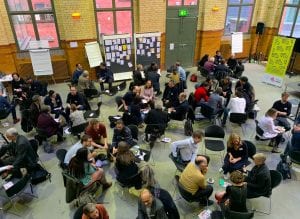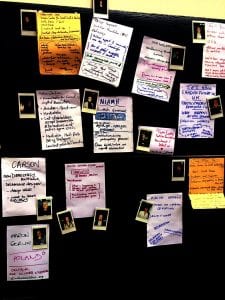Participation
Latest trends sweeping the globe – deliberative democracy here to stay?
February 6, 2020 by Niamh Webster 1 Comment | Category Democracy, Our work
Top tips from Korea to Brazil, Japan to France. Reflections on an international week of democratic innovations in Manchester – and the biggest gathering of democracy fanatics I’ve ever had the pleasure to meet.
Thanks to David Attenborough, citizens’ assemblies hit the headlines a couple weeks ago. Speaking at the UK climate change assembly, Sir David’s presence highlights the rise in popularity of this new way of doing democracy. More and more are happening around the world; they are designed to involve people in finding solutions to the big problems facing us all. While there’s plenty of different formats for these kind of events often called mini-publics, what they all have in common is discussion and debate by people. A sample of the population, considering evidence and information, hearing each other’s views and making proposals or recommendations is part of political decision-making.
I’ve been working in this democracy space for a long time already, and feel I’ve become quite specialist. But it’s only been 5 years. Many more people have dedicated their entire working lives to this, long before I jumped on the bandwagon.
A global gathering of these experts, innovators, practitioners, advocates, public servants and academics happened last week in Manchester. Rarely do you get so much global experience in one room. Especially when it’s the people responsible for running deliberative projects from Canada to Korea, Brazil to Japan. It was a golden opportunity to share common challenges and to learn from good examples.
But what made it different from any other conference was a space to reflect. Together we looked critically at the global growth of this new ‘wave’ of democratic innovation and deliberative democracy. Is it just a passing trend or here to stay?
Research presented at this conference by OECD suggests a dramatic increase in the use of mini-publics since 2010 and looks to exponentially grow. I won’t dig into the results now because it will be published soon (watch this space!). Research like this is sorely needed; up until now data has been collected erratically. Spolier! The research shows us it’s a trend worth paying attention to.
Images above: Polaroids of people, with their introductions to help you meet people from around the world
To bring these democratic innovations to life, here’s the best learning points I heard all week:
Lessons from around the globe:
- Make deliberative democracy routine at a local level – too often, success is defined as an initiative being rolled out nationally. But experiences in Canada of Citizen References Panels in Toronto and Poland show that it’s possible to involve people routinely in governance – regardless of national politics going on above.
- Blend digital with deliberative democracy to augment – Madrid, Spain led the way with their genuinely bottom-up participation process. DecideMadrid platform lets people submit ideas, these are themed with the highest priority further developed by a randomly selected citizen panel. After reaching a certain threshold of popularity, the proposals must be debated by the politicians. This institutionalises citizen voice in the political process. Digital is also used cleverly to support deliberation in the French Citizen Assembly on Climate Change. A platform called ‘Contribuez’ gathers ideas and submissions from the public and stakeholders. These will be summarised three times while the citizen assembly is running and then fed into the assembly, as well as being made available online.
- Unintended consequences can be worthy outcomes – Waltham Forest Council, London are tackling hate crime in their citizen assembly. Hopefully they get some concrete actions out of it, but they mainly aim to build some solidarity between different communities of protected characteristics sharing what they have in common.
- Don’t ignore the personal impact of taking-part – Laurie Drake, Canada first got involved after attending a citizen assembly 10 year reunion with her husband. She was bowled over that the experience had shaped them so profoundly. Similarly, in France’s citizen assemblies participants become advocates – holding public ‘aperitif’ events between assembly meetings to spread the word, helping to build trust in the process.

Photo: Ed Cox, RSA
It’s your choice – will you like or lead?
In Canada, France, Spain and Poland they’re making new kinds of democracy the new normal. This could be replicated the world over. As one participant challenged; ‘Governments have a choice to make – are they likers or leaders?’
Scotland is internationally recognised as innovative and progressive. We’ve seen citizen juries, participatory budgeting and now citizen assemblies. People across the world will be watching as we plan our upcoming climate citizen assembly. Nonetheless, it shows there’s still a long way to go. As a government we ask questions, use service design and user research to instil a culture of co-production. Scotland made leaps and bounds with the community empowerment Act. Open government commitments and values in our National Performance Framework guide our work.
For now, it seems Scotland is very much ‘on trend’. We are part of the ‘deliberative wave’ sweeping the world. But citizen assemblies are just one part of that; deliberative democracy has so much more to offer.
As I travelled home, I returned to thinking about how our digital team supports these new democratic innovations. I’ll be speaking about this next month at the civic tech TicTec conference in Iceland. I’ll keep working on this, and so will others around the world. From where I am, it looks like this fashion is here to stay.
Niamh Webster
Digital Engagement Manager
@niamhwebster
Thanks to all the organisers for an excellent week in Manchester:
- UK Government Innovation in Local Democracy Programme hosting the Innovating Local Democracy local government event (See more on Twitter #innovatinglocaldemocracy)
- Claudia Chawliz and the OECD Open Government Unit for hosting the Innovative Citizen Participation Network meeting (Read the members list and see more on Twitter #delibWave)
- Democracy Research and Development Network international (Democracy R&D)
Tags: Citizens' assemblies, civictech, conference, deliberative, deliberative democracy, democracy, democratic innovation, international




In the 1990’s I found myself chairing a citizens forum. New Bedford, MA USA had lost 10,000 jobs or 20% in 8 years. No one knew what to do. A small group started chatting and decided to develop a mission statement. We committed to trying to include the for Profit, Not for profit, government, university/ research sectors and community people. We acknowledged that there were global patterns of change with which we needed to align ourselves and we placed ourselves in the service of all who shared our hopes. The original 7 expanded to a list of about 150 from the region. We called ourselves the “No name Forum” and agreed to do nothing ourselves other that to give others a platform to speak Within 3 years participants who chaired nominating committees started to populate non profits with new leadership., volunteers developed a wetlands replication strategy to extend a runway at the airport, efforts to develop an intermodal transportation network to support the state effort to develop an undergraduate school into an ocean-marine and environmental research university, An effort to build an aquarium was launched, an effort to win an historic urban national park was successful. The first chair of a new Community Foundation was selected from the forum. I tell the story because we started with no one knowing what to do. All we had was good will.
The forum lasted 5 years. We had agreed that when people started coming because they needed to be there instead of because they wanted to be there it will have become politicized and we would end it. Three years later The mayor approached me at an NAACP breakfast and said, “We have to restart the Forum. There is no way to think about the future without the forum.”
There is considerably more. If this sounds like it may be useful I am happy to provide you with more, such as the role of the press, the rules of conduct etc.